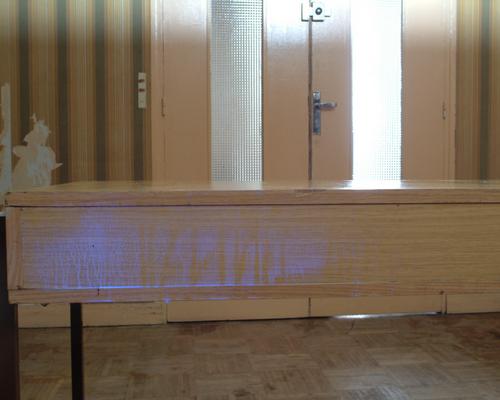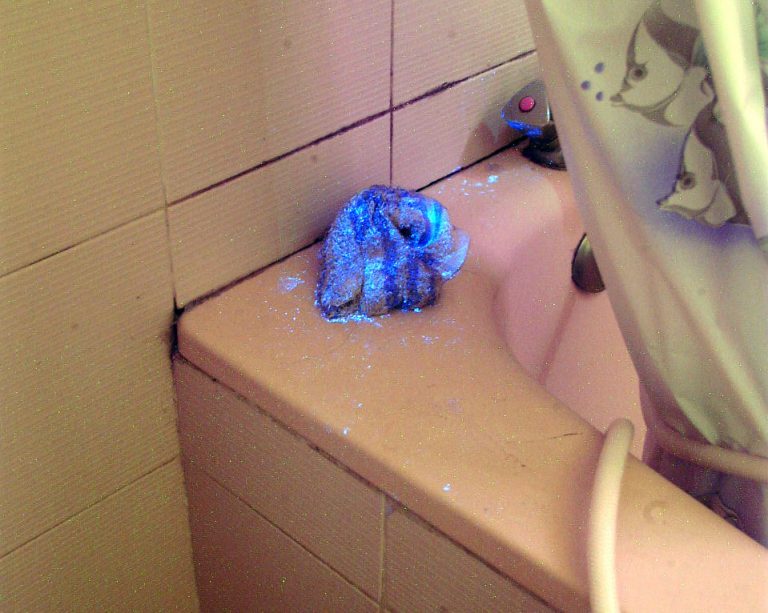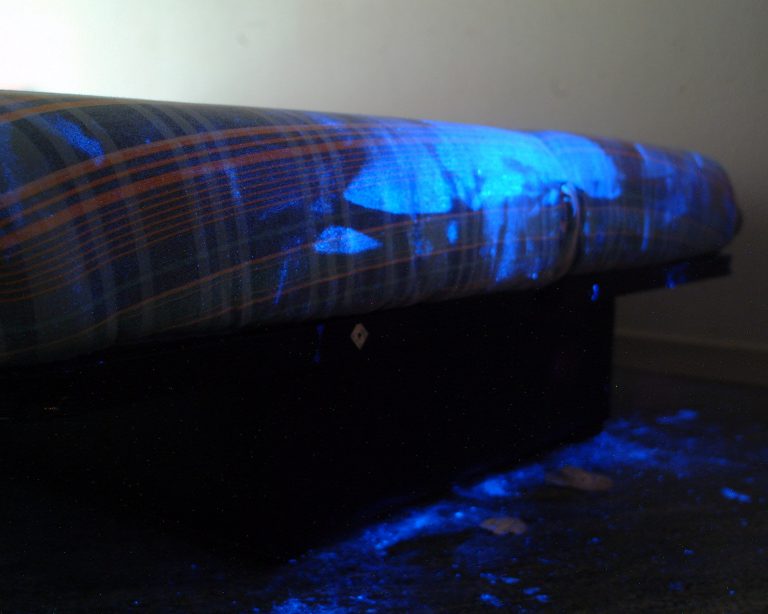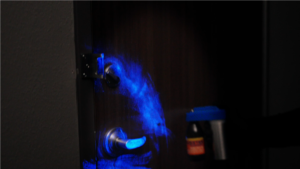Mystery around a disappearance
In February 2004 the body of Yves Bourgade was found mutilated on the edge of the forest. Suspicions and evidence lead to his wife. Lacking proof, here is the story.

No tears, no confession. Despite improbabilities, contradictions and all the inconsistencies of her story, in the accused box, Florence Féderlé remained stonily indifferent. Immured in this haughty, theatrical, impassive attitude she is claimed to have, she resisted. “By education” notes Jean-Marc Mery her lawyer. By constitution as well, or both, meddled in this lean looking body and peeved faced little woman.
At 45, this mother of three children ages 8, 13 and 15, answered for the murder of her husband before the Court of Justice of Evry, this past January. She incurred up to 30 years imprisonment for a crime that mixed tragedy and horror as it happens sometimes in isolated small towns, behind closed doors. It is the case of Moigny-Sur-Ecole (91), a comfortable village where the couple lived, where everyone is sure to know one another despite distorting gossips and rising rumours. And when a crime occurs, it sticks to the local geography: deserted nights, isolation and proximity of the forest.
On February 27th, 2004, alerted by a foul smell, a cyclist entered the parking area of the forest of Grands Avaux, between Moigny and Barbizon, attracted by flames as tall as a man, and a macabre discovery

A calcinated and mutilated human body lying on two canvass sheets, with no head, hands or feet. Ther was no way to identify the body without teeth or digital prints. No way to date the murder, no way to establish the cause of death. The liver was ruptured, a vertebral fracture was discovered. The autopsy revealed a massive consumption of sleeping pills, namely Zopiclone, a powerful sedative. but the only thing spared by the flames was a cigarette butt. It would take three months to the criminal police of Versailles to link the case to Yves Bourgade, 44 years old, very good-looking, having scarred ankles. On the eve of February 27th, the disappearance of this entrepreneur was reported by his wife to Police department of Milly La Forêt. Making use of time, place, and DNA testing, the investigation lead to Florence Féderlé. Her time schedule before the discovery of the body is critical. Put together, the pieces of the puzzle build up the story of an ordinary couple, with the hidden facets, resentments and all that’s left unsaid.
At 5 a.m. on February 25th 2004, Yves returned home to their villa with pool which they rented since they sold the house at Moulignon (77) to pay their debts. The couple lived in grand style; receptions, car collection for Yves and extravagances for Florence for whom the credit card was a relief. As a mother, she found it a way to spoil her children, as a cheated spouse a way to compensate with her husband’s unfaithfulness. Extramarital affairs which Yves boasts about, sometimes in his wife’s presence, a wife who put up with his adulterous affairs for 14 years as well as with her husband’s strong propensity for alcohol.

This February 25th is just another excess. But this time talking turns into shouting. In debt again, the couple is drifting apart. The eldest of their three children remembers the yelling. His sister, a door being shattered. At 6:45, the kids were asleep when the accused called her husband’s employee to cancel their appointment: “Yves has gone awry, he left”. At 7.00, she called the neighbor who recalls: “She wanted me to watch the children, but I had to work. Yves did not go well, I thought about the alcohol.” At 7.15: another call. This time, the neighbor agreed to take the children to Florence’s sister Frédérique Féderlé’s house. At 7.30, they were awakened, dressed in a hurry and driven to Barbizon. They stayed there two days and two nights but their mother did not stay with them until the second night. Fallible alibi: she could have gone out without them noticing. “I was under shock” she explained. “Yves had just told me he was leaving me for a 25 year old woman.” He allegedly threw a few personal effects in a plastic bag and ran off in a grey Scenic waiting outside for him. Without saying goodbye to his children. Further, all of this for a ghost mistress, to whom no call was ever recorded and no sign of her number written anywhere. During the three months that followed, Yves Bourgade gave no sign of life. Not to his wife, not to his mother.

His wife became his spokesperson. She alerted close family members, then reports to the Police, and tells her story, with variations that troubled so much Edith, Yves’s sister, that she wrote them down in her journal. Very early, the Bourgades noticed her lack of eagerness to shed new light. It was them who insisted upon her launching the search “in the interest of families”. It was them who issued a missing person notice on the Internet, bringing down the wife’s wrath upon them: “I wanted to partake in the writing of the notice”, she claimed. They protested when she cancelled Yves’s cell phone subscription, “the only link left”, choked Edith. possessions. As if she were sure that he wouldn’t return.
Finally, they were surprised when she rushed to sell their possessions. As if she were sure that he wouldn’t return.
In the courtroom, she repeated over and over: “I have no answer to give.” She stumbled over her words, her phrases were hesitant: “Hum, well, I mean.” She was asked to explain herself on the time Yves left. To the family, she had said 4.00 p.m. To her sister she had said 2.00 p.m. Now, she confirmed her last statement: 10.00 a.m. Why getting rid of the kids? “By, well… need to make a call, to know if her friends knew this woman.” Or to devote herself to her infamy, erasing all traces.

After identification of the body, at the end of May, the police discovered that she intended to settle in Berry and that she had changed the carpeting. Trivial justifications: “They were dirty. The owner wanted to replace them”. They had been disposed of at the waste site but they were nowhere to be found.
But, with the use of Bluestar®, a powerful chemical reagent, blood stains were discovered on the walls of the bedroom, the bed frame, the bathtub, and at the entrance to the house, on the fire extinguisher. The stains had been washed out to the point that they did not provide DNA upon testing


And that is not all. As soon as he returned, Julien noticed that all of Yves’s professional tools, drilling machine, jigsaw, buff wheel had disappeared. “Yves must have taken them with him.” She said. New evidence: one of the two canvass sheets used to wrap the body came from her husband’s equipment, the other from the pool. As for the sleeping pills, they were prescribed on the eve of Yves’s departure. She was also the one who smoked the cigarette found on the canvass. While this evidence was presented against her in the courtroom, she interrupted: “Frame-up”, before hurling “I’m accused of a horrible crime”, her eyes looking straight in the eyes of the deceased’s mother. “But I didn’t kill my husband. It’s barbarians, sadists who did that”.
No tangible proof can confound her. Here, it’s the lapses that inform, voids that designate. Coincidences turn into evidences, attitudes betray, weaknesses of her story outline her own hand. “like in etching”, stated the prosecuting attorney, who asked for 16 years of imprisonment for a crime of such barbarism that collective consciousness is reluctant to attribute that to a woman. Incarcerated for 31 months at Fleury-Mérogis, she never confessed. These 4 days of trial did not make her blink. Not even her prostrated son Julien’s testimony, confused, evasive, in an attempt to defend her as to preserve himself from a terrible predicament. Not even the statement read before the court from her late father: “I think that my daughter has gone awry. She had become obnoxious, aggressive. He pushed her to the limit with all these other women. She went crazy. Like my mother […] I worried when he did not give any sign of life, at least to his mother.” On the plaintiff bench, this lady, great in dignity, does not break down.
The reading continues: “During the three months that followed, said the father, my wife and I suspected Florence to have killed her husband. She must have panicked, wanted to hide her gesture and sunk to protect the children. Confide, she would have never done it. She was hermetic, but she’s my preferred daughter. She knows I know her.” Florence Féderlé chose silence. She was sentenced to 20 years imprisonment.
Source: Paris OBS of 02/01/2007
Author: Isabelle Curtet-Poulner
Translated from French
(*) This sentence was reduced to 15 years in prison by the judgement in appeal.
Mystery around a disappearance




















